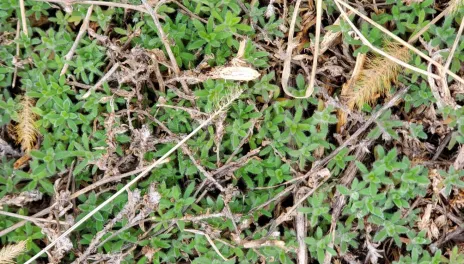Controlling Kochia: NCREC Research Takes Aim at Herbicide Resistant Weed
Kochia has been a very troublesome weed in the Northern Plains for decades. Farmers’ ability to control kochia has become even more difficult since kochia has developed resistance to some of our commonly used herbicides, says Brian Jenks, North Central Research Extension Center weed scientist.
In recent years, agronomists at the NCREC near Minot have observed that some kochia populations are no longer completely controlled by glyphosate, Starane and dicamba.
“Glyphosate has been used in no-till production to control weeds just prior to or after crop planting,” says Jenks. “In 2012, kochia was found to be glyphosate-resistant in some North Dakota populations. Since then, growers have relied heavily on Group 14 PPO herbicides like Sharpen and Aim to assist in controlling kochia in a burndown situation.”
However, in December 2022, NDSU research showed that some kochia populations are resistant to glyphosate and the Group 14 herbicides, Sharpen, Aim, Vida and Reviton. Kochia resistance to Glyphosate and Group 14 herbicides will leave no-till farmers with few preplant foliar burndown options.
Additionally, NDSU research demonstrated that these kochia populations are less sensitive to other extremely important soil-applied Group 14 PPO herbicides like Spartan and Valor. Many growers rely on Spartan and Valor to provide residual kochia control through root uptake.
Not all kochia is resistant to these Group 14 herbicides, but farmers should actively monitor fields following herbicide applications, advises Jenks.
Kochia will need to be managed through cultural practices in addition to using other herbicide modes of action. Rotation to crops such as wheat and corn will allow other effective herbicide modes of action to be used. Gramoxone remains an effective option for burndown kochia control in front of any crop.
Using dicamba in dicamba-tolerant soybeans as a pre-emergence treatment has provided effective kochia control. Metribuzin provides another mode of action and has been effective when used pre-emergence in soybean, dry pea and lentil.
The National Agricultural Genotyping Center is developing a genetic test that will determine if a kochia plant is resistant to Group 14 PPO herbicides. Farmers will be able to send two to three kochia leaves for testing and will receive results within a couple weeks. This genetic test will be a significant help to growers so they can quickly adjust their management strategies, if necessary.
